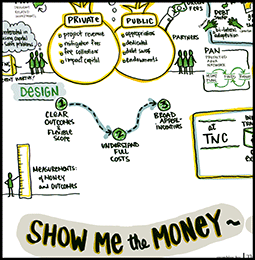Topics and approaches that stretch broadly across our
strategies for marine conservation and have been identified as important learning
opportunities to advance marine conservation, including: communications,
sustainable finance mechanisms, working in whole systems, successful strategy
design and new conservation challenges on the horizon.
ExpPract 1: Conservation by Design For The Global Challenges/Global Solutions Era
Presenters: Heather Tallis and Peter Kareiva
Description: Participants discussed the newly launched effort to bring Conservation by Design into a human-dominated world. In 1995, The Nature Conservancy adopted “Conservation by Design” as its framework for setting conservation priorities and advancing strategies. The consistency and clarity of the approach brought great credibility to our work and led to uptake well beyond our own projects. Much has since changed. We now have much greater understanding of the magnitude of human impacts on the natural world, and how “traditional” approaches alone (e.g., protecting “the last great places”) will fall short of the conservation called for in the Conservancy’s mission. The Global Challenges/Global Solutions framework captures the need for approaches that drive systemic change for nature and people. And, advances in the scientific community provide a rich, new set of tools we can bring to bear on these efforts. The refresh of Conservation by Design will incorporate these advances, and better support and empower Conservancy teams to have impact in their work.
Resources:Session Summary
Heather Tallis: Conservation by Design Refresh Presentation |
Presentation
ExPract 2: Show Me the Money: Financing Marine Conservation 
Presenters: Andrew Soles, Trina Leberer, Robert Weary, Bill Ginn.
Description: You’ve perhaps heard the rhetoric “TNC’s staff are experts at bringing innovative financial approaches to conservation”. Is it true? In this session, participants heard from a range of sustainable finance mechanisms being used and explored by the Conservancy and explored potential financing ideas that might be appropriate for marine conservation projects.
Resources:Session Summary |
Graphic Facilitation Drawing
Andrew Soles: Sustainable Conservation Finance |
Presentation
Trina Leberer: Micronesia Challenge Sustainable Finance |
Presentation
Trina Leberer: Palau PAN Sustainable Finance Mechanism |
Presentation
ExpPract 3: Stepping Off the Deep End: Strategies to Build a Successful Project
Presenters: Anne Birch, Jenn Greene, Kirsten Evans, Jensen Montambault, Cristina Lasch, and Ralph Barker
Description: This interactive session was designed for staff to learn from each other and to deliver concrete information on how to build a project framework that sets you up for success, regardless of the project size or your experience. Are you new to designing and leading projects? Have you been tapped to lead a bigger, maybe ‘scarier-scale’ project? How do you start a project from the ground floor? Do you have low capacity? When do you bring in partners and which ones? The steps and challenges are similar whether you are new or an old hat and the projects are large or small. We encouraged project managers with any level of experience share challenges and successes in developing and managing successful projects.
Resources:
Anne Birch and Jenn Greene: Strategies to Build a Successful Project |
Presentation
Cristina Lasch: Steering partnerships Baja Marine Initiative |
Presentation
Jensen Moneambault: TNC Global Impact Science |
Presentation
Kirsten Evans: Communicating Measures Effectively |
Presentation
Ralph Barker: Finance Project Success Case Study |
Presentation
ExpPract 4: Silo Busting: Addressing Marine, Coastal, Freshwater and Terrestrial Objectives When Scaling-up to Whole Systems
Presenters: Chuck Peoples, Kim Hum, John Torgan, Rick Hamilton, Carl LoBue, Mary Kate Brown, Willie Atu
Description: Oftentimes, our work reaches across not only marine strategies, but also interfaces with a range of other objectives stemming from terrestrial and watershed conservation, social and economic needs and other aspects. In this session, participants shared examples of what whole system work necessary to achieve coastal and marine conservation looks like. Participants explored lessons learned and pitfalls to avoid; success strategies for working in whole systems for marine; and use of conservation planning to develop information underpinnings for informed strategy development and decision-making.
Resources:
Chuck Peoples: Addressing Marine Terrestiral and Freshwater Objectives in Conservation |
Presentation
Carl Lobue: Eutrophication, the Collapse and Recovery of Marine Ecosystems |
Presentation
Mary Kate Brown: Looking Through a Bigger Lens in Alabama |
Presentation
Willie Atu: Ridges to Reefs Conservation in the Coral Triangle |
Presentation
ExpPract 5: Testing the Waters: Large Scale Marine Conservation Challenges and Creating a Proactive Culture at TNC
Presenters: Marci Bortman, Elizabeth Codner-Smith, Vera Agostini, Nicole Maher and Jay Udelhoven
Description: In this session we will heard TNC staff describe how they have explored some of our ocean’s most pressing challenges (for people and nature) such as aquaculture, water quality, and fisheries vulnerability due to climate change. These were all discussed as examples of challenges on the horizon that could have enormous consequences for marine conservation if ignored. Participants gave suggestions on how to move forward on these and other large scale issues so that TNC can become a more proactive marine conservation organization.
ExpPract 6: Communications IS Part of Your Conservation Strategy
Presenters: Tom McCann, Cara Byington, Jordan Jobe, Cherie Wagner, Jenn Greene, Gondan Renosari, Chris McGuire
Description: Communications can make or break our work. Unfortunately, we often don’t take the time, or consider the need, to think about how to communicate about our projects until the actual work is done, or the grant is written. Communication becomes an afterthought to conservation when it should be part of the foundation of our work. In this session we will examined how and why thoughtful communication is fundamental to conservation success, how to work with resources that are available, and explored a framework for how to develop a communications strategy in the absence of dedicated staff support (identifying your audiences, asking the right questions, developing messaging and more). We also shared examples of communication partnerships and strategies that have been successfully implemented.
Resources: Session SummaryGondan Renosari: Communications and Conservation in Indonesia |
PresentationJordan Jobe and Cherie Wagner: Reef Resilience, Communications and Conservation Strategy |
PresentationTom McCann: Strategic Communications for Conservation |
Presentation